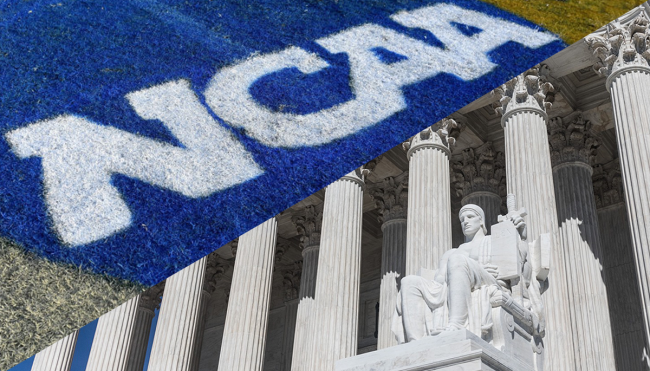
Getty Image / Pixabay
If I had to sum up the relationship the NCAA has traditionally had with its student-athletes, I’d probably compared it to a boxing match. In one corner, there’s an undefeated heavyweight champion who’s receiving all of the revenue generated by the fight, and in the other, there’s an amateur boxer with both of his hands tied behind his back who only agreed to step into the ring without being compensated because it’s the only real way for him to get exposure.
For the majority of its existence, the NCAA has been pummeling its opponent while asking “What are you going to do?” However, that all changed a couple of years ago when California became the first state to pass a law that would allow college players to be compensated for their name, image, and likeness, which resulted in the organization trying to remember how to defend itself from the flurry of punches that have put it up against the ropes.
As more and more writing appeared on the wall, the NCAA scrambled to put together a stop-gap proposal in an attempt to appease its critics, but it may be too little too late when you consider the issue has caught the attention of lawmakers in Congress who have put together a “Bill of Rights” that would dramatically alter the landscape of college sports.
However, that’s not the only branch of the federal government that’s gotten involved. On Wednesday, the Supreme Court conducted oral arguments for NCAA vs. Alston, which was filed by a former West Virginia University running back who’s accused the NCAA of violating antitrust laws.
If the NCAA headed into the day hoping the majority of the Supreme Court’s nine justices would be on their side, they got a very rude awakening once the hearing got underway. Clarence Thomas kicked things off with a bang by asking why athletes aren’t entitled to a single cent when there’s no limit on how much coaches can be paid (he even dropped an “It strikes me as odd,” which I’m pretty sure is the legal equivalent of “I Just Find It Funny That…”)
https://twitter.com/NicoleAuerbach/status/1377262317499527168
Samuel Alito also chimed in with a fairly scathing indictment of the NCAA’s business model.
Justice Samuel Alito: pic.twitter.com/nMdK5VsDRM
— Chantel Jennings (@ChantelJennings) March 31, 2021
That was just the beginning, as other justices noted it seems like the NCAA operates as a monopoly that has the final (and only) say in how much student-athletes can be paid.
https://twitter.com/NicoleAuerbach/status/1377266196836454406
https://twitter.com/NicoleAuerbach/status/1377267530725797902
Brett Kavanaugh even dropped the words “exploitation” and “conspiring,” which are usually things you don’t want to be associated with when you’re the defendant in an antitrust case.
https://twitter.com/NicoleAuerbach/status/1377267790873309189
https://twitter.com/NicoleAuerbach/status/1377268401362571269
Amy Coney Barrett also asked what I assume was intended to be a rhetorical question, as I don’t think the majority of people who watch college sports do so because they take pleasure in knowing the people playing them aren’t getting a cut of the billions of dollars they help generate.
Coney Barrett asks if consumers "love watching unpaid athletes." The question is critical, as it seems that the Supreme Court may apply the Rule of Reason–rather the "quick look" test the NCAA wants–to the NCAA amateurism rule. She's asking if there's a pro-competitive benefit.
— Alicia Jessop (@RulingSports) March 31, 2021
I am certainly not a legal expert, but I have a feeling the attorneys who were tasked with defending the NCAA are going to need a three-martini lunch after that. It could take months for the Supreme Court to officially issue a ruling, but if what went down today is any indication, the NCAA might want to brace itself.